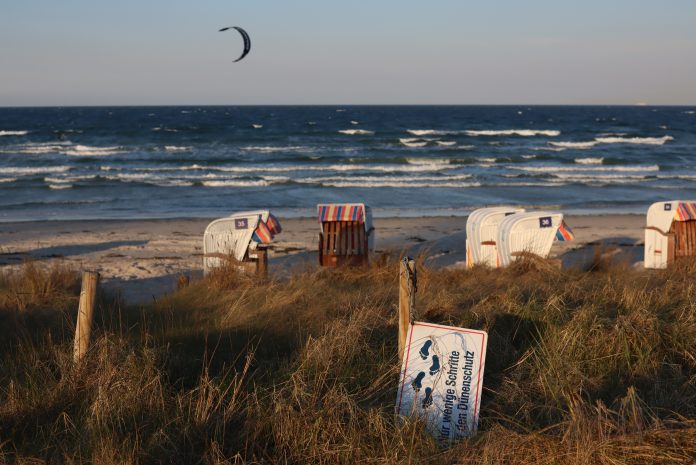The Climate Service Center Germany (GERICS) and the Blue Flag Programme cooperate on the coastal tourism adaptation to climate change
It is not accidental that in 2022 #beach ranked as the 46th most popular hashtag worldwide on Instagram. The sound of the waves, the turquoise waters, and the feeling of wet white sand between the toes deliver peace, calmness, and tranquillity – and people like to boast about it. Beaches evoke an emotion known to improve physical and mental well-being and have become a primary destination for leisure, relaxation and recreation. Yet, for many people, coastal and beach tourism goes beyond mere sunbathing and relaxation.
People flock to the beach and coast for a variety of reasons, such as boating, sailing, kite surfing, windsurfing, diving, snorkelling, fishing, birdwatching, and whale watching. In Europe, coastal tourism plays an essential role in many EU Member State economies, with a wide-ranging impact on economic growth, employment, and social development. In 2018 (pre-covid) coastal tourism sector contributed to 40% (€218.3 billion) of the total European Blue Economy (1) gross added value, generating 64% of the employment of the EU Blue Economy.
Nonetheless, such a remarkable industry is highly climate-sensitive as it also depends upon the coast’s pristine nature and the beach destinations’ capacity to provide adapted services and security. (2)
Sea level rise and coastal erosion are changing our beach day-outs
Amongst the number of threats to beach tourism, climate change is already having a significant impact. Sea level rise, flooding, coastal erosion, and increased frequency of storms and heat waves are affecting the security and attractiveness of coastal destinations.
What for some beachgoers is a threat to their holiday pictures to be shared on social media, to coastal managers and municipalities it means coping with the degradation of the natural environment, loss of biodiversity, the reduction of the quality of the infrastructure and amenities, the availability of potable water, and the emergence of infectious diseases. (3)
Even if the climate change threats to the beaches and tourism-related activities are well documented, coastal municipalities and beach managers have limited capacity to incorporate climate change information in their decision-making. A recent study highlights the lack of easy-to-access information and the low level of awareness amongst stakeholders as the most compelling reasons why climate change information has so little application in the beach and coastal tourism sector. (4)
Climate services to better manage beaches and coastal areas
To overcome these challenges, the Climate Services Center Germany (GERICS) in cooperation with the Blue Flag programme of the Foundation for Environmental Education aims to co-develop climate services and indicators to enable the application of climate change information into beach management and decision-making.
The Blue Flag programme is an international award for beaches and marinas that meet several standards for water quality, environmental education, beach management, and safety, among other criteria. However, with the growing concerns over climate change and its impacts on coastal environments, it is becoming increasingly important to consider the effects of these changes on the sustainability of beaches and marinas for the Blue Flag award.
The Climate Services Center Germany (GERICS) supports the development of climate services and information essential to help coastal municipalities and the tourism industry to adapt to these changes and ensure their long-term viability. GERICS aims at bridging the gap between the provision of complex climate change information and decision-making.
Decision-making in the Blue Flag programme
The goal of the GERICS – Blue Flag programme collaboration is to enable the incorporation of usable and useful climate change information into municipal coastal decision-making such as in the Blue Flag assessment criteria to ensure that operators are prepared to adapt to climatic changes. This will also support the Blue Flag programme continues to recognize and award beaches and marinas that are not only environmentally sound but also resilient in the face of climate change.
For example, Blue Flag criteria can be updated to include requirements for considering the potential impacts of climate change, such as the need for regular monitoring of beach erosion, as well as the implementation of measures to protect coastal habitats and infrastructure. This can include the development of plans for adapting to rising sea-level and the creation of contingency plans for responding to increased periodicity and intensity of heat waves.
As coastal environments are increasingly affected by the impacts of climate change, GERICS is committed to providing prototype climate services for coastal municipalities and tourism operating stakeholders. GERICS aims to facilitate the incorporation of climate change information into decision-making. The main goal is to ensure coasts and beaches continue to provide essential ecosystem services, promoting environmental sustainability and coastal resilience while keeping the #beach hashtag climate resilient.
The BEACH-SOS Project: A new chapter in beach management
The BEACH-SOS project, a collaboration between GERICS and FEE International’s Blue Flag Programme, is funded by the Interreg Baltic Sea Region Programme 2021-2027. This initiative focuses on understanding how climate change affects the Baltic Sea Region’s shores.
The project has explored how beach and coastal tourism managers in the Baltic Sea Region perceive climate change indicators and their urgency. It emphasises the need for climate information in both short-term and long-term planning. Essential data, such as sea level rise, sea storms, and the Universal Thermal Climate Index, have been identified, along with the best ways to distribute this information. Additionally, the project highlighted the challenges in accessing and using climate data and the need for external support.
Furthermore, the project has catalysed change, empowering coastal communities in Latvia, Germany, and Denmark to shape their own destinies. Through workshops and capacity-building initiatives, local leaders in beach management and coastal tourism have gained knowledge on the importance of integrating climate data into their planning processes.
Imagine coastal towns in 2050, thriving and resilient. BEACH-SOS has worked with these communities to draft visionary plans for their future, taking into account the impacts of climate change. This proactive approach not only raises awareness but also empowers municipalities to make informed decisions that ensure the long-term sustainability and resilience of their coastal areas.
BEACH-SOS has planted the flag of sustainability in coastal communities to shape their own climate-resilient future. As the project draws to a close, its legacy will continue to inspire and guide coastal managers and tourism operators. By embracing climate-smart strategies, we can ensure that our beloved beaches remain vibrant and sustainable for generations to come. Let’s make #beach a symbol of environmental stewardship and climate action.
References
- The European Commission defines the blue economy as “All economic activities related to oceans, seas and coasts. It covers a wide range of interlinked established and emerging sectors.”
- Nurse, L. A., McLean, R. F., Agard, J., Briguglio, L. P., Duvat- Magnan, V., Pelesikoti, N., Tompkins, E., & Webb, A. (2015). Small Islands. Climate Change 2014: Impacts, Adaptation and Vulnerability: Part B: Regional Aspects: Working Group II Contribution to the Fifth Assessment Report of the Intergovernmental Panel on Climate Change, 1613– 1654. https://doi.org/10.1017/CBO9781107415386.009
- Arabadzhyan, A., et al. (2020). “Climate change, coastal tourism, and impact chains – a literature review.” Current Issues in Tourism 24(16): 2233-2268.
- Damm, A., et al. (2020). “The market for climate services in the tourism sector – An analysis of Austrian stakeholders’ perceptions.” Climate Services 17.








